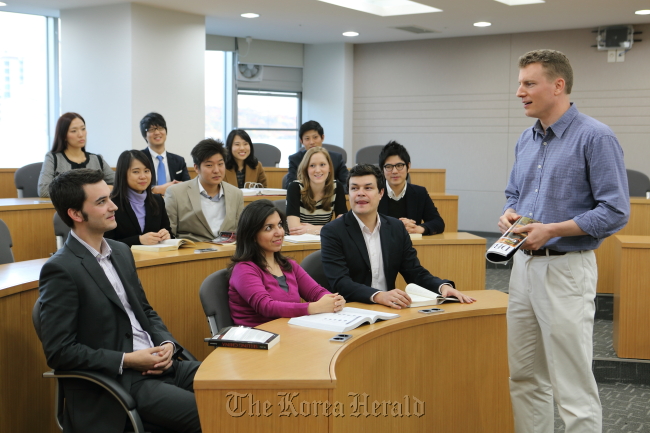Economic uncertainty fuels demand for MBAs
More young employees pursue degrees abroad; schools offer flexible courses for studying without leaving full-time job
By Korea HeraldPublished : Dec. 3, 2012 - 20:37
The boom in MBA programs in the early 2000s has been on the wane in the wake of the global economic crisis. Top business schools around the world have lost some of their appeal and their number of applicants continued to decline.
Yet, recent figures show that business schools are slowly regaining steam and the demand for high-caliber MBA graduates with strong overseas credentials is growing in the highly competitive job market.
According to the Graduate Management Admissions Council, the number of Koreans taking its Graduate Management Admission Test, which is required for admission to most business schools around the world, peaked in 2008 at 7,591.
Yet, recent figures show that business schools are slowly regaining steam and the demand for high-caliber MBA graduates with strong overseas credentials is growing in the highly competitive job market.
According to the Graduate Management Admissions Council, the number of Koreans taking its Graduate Management Admission Test, which is required for admission to most business schools around the world, peaked in 2008 at 7,591.

Although there was a nearly 30 percent decline from 2008-11, following the global economic crisis, the number is on the rise again to 5,275 from 5,253 from a year ago as of June this year.
Cho Hwa-yeon, assistant director of admission at the SKK Graduate School of Business at Sungkyunkwan University, noted that the school saw a nearly 26 percent increase in applications last month from a year earlier.
The number of applications from abroad, in particular, improved significantly, and they have come from more diverse nationalities, she told The Korea Herald.
“Korea is emerging as one of the preferred destinations for foreign MBA students, as the average cost is less than at the top U.S. and European schools, but the quality is still very high,” Cho added.
While foreigners’ demand for local MBA courses is on the rise, indicators show that more Koreans want to take overseas MBA courses.
The GMAC data show that although the majority of Korean applicants still choose U.S. business schools as their favorite destination, now more young employees are looking at Europe and Asia as alternative options.
“Each year, we welcome between five and 10 South Korean participants, attracted by the quality of our program and working environment,” Philippe Oster, admissions director at HEC Paris, said in an email interview with The Korea Herald.
Established in 1881, HEC Paris is one of the foremost business schools in Europe, receiving around 2,000 applications each year from around the world.
The official noted that the school’s strong faculty and international alumni network of over 45,000 graduates, including French President Francois Hollande, help attract more highly qualified students.
“Over recent years we have seen an increase in the quality of the applications demonstrating a true desire from candidates to increase their professional potential and international outreach,” he added.
Most business schools today offer a variety of MBA options, including part-time, full-time, flexible, and even distance learning, allowing professionals to gain management skills without leaving their full-time jobs.
According to the survey by QS TopMBA.com, there is now a shift from the number of applicants applying for the traditional two-year courses to one-year or part-time courses.
The reason, it says, is because in a prolonged economic volatility, more people opt to complete an MBA while continuing their full-time job.
Recent figures show that many top blue-chips, banks, consultancies and law firms are now looking for top-ranked MBA students.
A survey by the Graduate Management Admission Council found that 79 percent of global corporate recruiters intended to hire at least one MBA candidate in 2012, with 60 percent saying they continually seek MBA degree-holders.
Korea’s KB Financial Group, for instance, hired nearly 100 people with overseas MBA degrees earlier this year.
Despite an increasingly competitive job market, MBA applicants are taking away from their work hoping that their sacrifices will pay off in the long term through enhanced career prospects and greater earning potential.
Observers, however, point out that there is now a wide array of courses available, from general MBAs to those specializing in finance, and also the cost varies considerably.
Students at top U.S. business schools, such as Harvard Business School and University of Pennsylvania Wharton School, pay more than $60,000 a year, while a 16-month full-time matriculation at SKK GSB in Seoul costs just over $41,000.
A high-class MBA is a “transformative experience” for participants, said the director of admissions at HEC Paris, but he noted that selecting the right school and course with regards to the candidate’s personality, ambitions and career objectives is crucial.
“This is why we highly recommend candidates to interact with schools, their current students, faculty and alumni as much as possible in order to make a well-informed decision,” he added.
By Oh Kyu-wook (596story@heraldcorp.com)
-
Articles by Korea Herald








![[Hello India] Hyundai Motor vows to boost 'clean mobility' in India](http://res.heraldm.com/phpwas/restmb_idxmake.php?idx=644&simg=/content/image/2024/04/25/20240425050672_0.jpg&u=)











